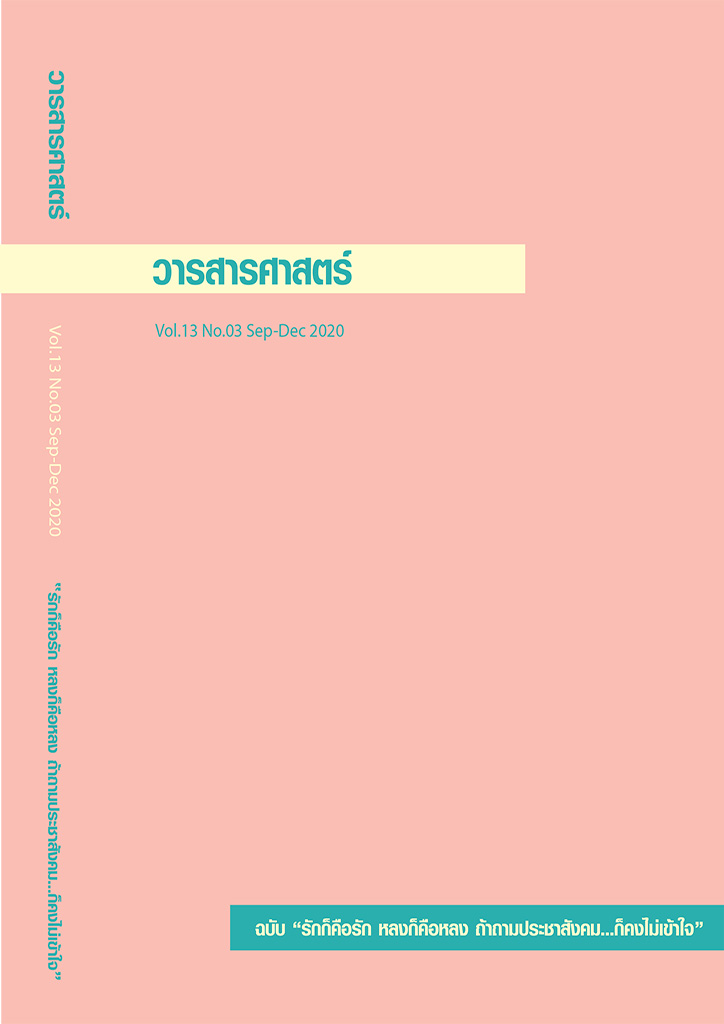Gender Distancing: Thai Yaoi Novels within the Politics of Literary Convention and Interpretation
Keywords:
yaoi, romance, Thai novel, gender politicsAbstract
Yaoi is the romance depicting male homosexual relationship mostly reimagined by female writers. Despite their homosexual contents, yaoi texts practice gender distancing. That is, the texts disregard the heterosexual relationship without defining their alternative romantic love through gay identities. This article hopes to analyze the politics behind gender distancing in the Thai yaoi novel through literary convention and interpretation of yaoi-in the lens of textualism and mode of reception. The analytical frame is conceived within the marriage between yaoi studies and popular romance studies. The case study is LazySheep’s The Read Thread (Dai Daeng). The analysis exposes the perpetual existence of gender distancing within the yaoi debates. The politics in literary convention of yaoi is to subscribe and challenge heteronormativity while simultaneously subverting homonormativity through the textual logic. As a Thai reincarnation romance, The Red Thread reassures the protagonists’ blessed reunion in their next lives rather than the assertion of gay identity. That is, Thai yaoi novels tend to endorse the pure love ideal beyond the ties of all genders or social issues.
References
ณัฐนพ พลาหาญ (2556), “วรรณศิลป์จุฬาฯ ใต้ร่มเงา ‘วายนะศิลป์’”, ปาจารยสาร, 37(1): 44-47.
ณิชชารีย์ เลิศวิชญโรจน์ (2560), หัวใจวาย, กรุงเทพฯ: Bun Books.
นัทธนัย ประสานนาม (2562), “นวนิยายยาโออิของไทย: การศึกษาเชิงวิเคราะห์”, วารสารวิชาการหอสมุดแห่งชาติ, 7(2): 16-34.
สมเกียรติ คู่ทวีกุล (2548), “ภาพสะท้อนชายรักร่วมเพศในนวนิยายไทยในสามรอบทศวรรษ (พ.ศ.2513-2543): การศึกษาศักยภาพ ข้อจำกัด และทางออกของนักเขียนหญิง”, วารสาร มนุษยศาสตร์ปริทรรศน์, 27(1): 136-145.
สุภาวรัชต์ วัฒนทัพ (2556), ภาพแทนคนรักเพศเดียวกันในนิยายวายจากสื่ออินเทอร์เน็ต, วิทยานิพนธ์ ปริญญาศิลปศาสตรมหาบัณฑิต คณะศิลปศาสตร์ มหาวิทยาลัยธรรมศาสตร์.
อนัญญา วารีสอาด (2553), อัตลักษณ์กับบริบททางสังคมในนิยายโรมานซ์แนวข้ามภพชาติของไทย, วิทยานิพนธ์ปริญญาอักษรศาสตรมหาบัณฑิต สาขาวิชาวรรณคดีเปรียบเทียบ คณะอักษรศาสตร์ จุฬาลงกรณ์มหาวิทยาลัย.
อรวรรณ วิชญวรรณกุล (2559), ผู้หญิงกับการสร้างนวนิยายชายรักชาย, วิทยานิพนธ์ปริญญาวารสารศาสตรมหาบัณฑิต สาขาวิชาสื่อสารมวลชน คณะวารสารศาสตร์และสื่อสาร มวลชน มหาวิทยาลัยธรรมศาสตร์.
อริน พินิจวรารักษ์ (2527), การใช้เรื่องรักร่วมเพศในนวนิยายไทย พ.ศ. 2516-พ.ศ. 2525, วิทยานิพนธ์ปริญญาอักษรศาสตรมหาบัณฑิต สาขาวิชาวรรณคดีเปรียบเทียบ บัณฑิตวิทยาลัย จุฬาลงกรณ์มหาวิทยาลัย.
LazySheep (2562), ด้ายแดง เล่ม 1-2, พิมพ์ครั้งที่ 3, กรุงเทพฯ: สำนักพิมพ์ Hermit.
Akatsuka, N. (2010), “Uttering the Absurd, Revaluing the Abject: Femininity and the Disavowal of Homosexuality in Transnational Boys’ Love Manga”, in Levi, A. et al. (eds.), Boys’ Love Manga: Essays on the Sexual Ambiguity and Cross-Cultural Fandom of the Genre, Jefferson, North Carolina: McFarland & Company: 159-176.
Bolen, D. (2016), “Homonormativity”, in Goldberg, A. (ed.), The SAGE Encyclopedia of LGBTQ Studies, Thousand Oaks, California: Sage: 542-544.
Fluck, W. (2017), “Reader”, in Thomsen, M. et al. (eds.), Literature: An Introduction to Theory and Analysis, London: Bloomsbury: 157-167.
Hitoshi, I. (2015), “Representational Appropriation and the Autonomy of Desire in Yaoi/BL”,translated by K. Suganuma, in McLelland, M. et al. (eds.), Boys’ Love Manga and Beyond: History, Culture, and Community in Japan, Jackson: University Press of Mississippi: 210-232.
Jeppesen, S. (2016), “Heteronormativity”, in Goldberg, A. (ed.), The SAGE Encyclopedia of LGBTQ Studies, Thousand Oaks, California: Sage: 492-496.
Kee, T. (2010), “Rewriting Gender and Sexuality in English Language Yaoi Fanfiction”, in Levi, A. et al. (eds.), Boys’ Love Manga: Essays on the Sexual Ambiguity and Cross-Cultural Fandom of the Genre, Jefferson, North Carolina: McFarland & Company: 126-156.
Kwon, J. (2019), Straight Korean Female Fans and Their Gay Fantasies, Iowa City: University of Iowa Press.
Lam, L. (2006), “Sexual Minorities”, in Gerstner, D. (ed.), Routledge International Encyclopedia of Queer Culture, London and New York: Routledge: 519.
Laurent, E. (2014), “Sexuality and Human Rights: An Asian Perspective”, in Graupner,H. and Tahmindjis, P. (eds.), Sexuality and Human Rights: A Global Overview, New York and Oxford: Routledge: 163-226.
Martin, F. (2017), “Girls Who Love Boys’ Love: BL as Goods to Think with in Taiwan (with a Revised and Updated Coda)”, in Lavin, M. et al. (eds.), Boys’ Love, Cosplay, and Androgynous Idols: Queer Fan Cultures in Mainland China, Hong Kong, and Taiwan, Hong Kong: Hong Kong University Press: 195-219.
Mizoguchi, A. (2003), “Male-Male Romance by and for Women in Japan: A History and the Subgenres of Yaoi Fictions”, U.S.-Japan Women’s Journal, 25: 49-75.
Prasannam, N. (2019), “Yaoi Phenomenon in Thailand and the Fan/Industry Interaction”, Plaridel: A Philippine Journal of Communication, Media, and Society, 16(2): 62-89.
Ramsdell, K. (2012), Romance Fiction: A Guide to the Genre, Santa Barbara, California: Libraries Unlimited.
Regis, P. (2003), A Natural History of the Romance Novel, Philadelphia: University of Pennsylvania Press.
Suansamut, P. (2009), The Ideology of Love in Popular Thai Tragic Romance, 1997-2007, unpublished Doctoral Thesis, Thai Studies Program, Chulalongkorn University.
Welker, J. (2008), “Lilies of the Margin: Beautiful Boys and Queer Female Identities in Japan”, in Martin, F. et al. (eds.), AsiaPacifiQueer: Rethinking Genders and Sexualities, Urbana and Chicago: University of Chicago Press: 46-66.
Yang, L. and Xu, Y. (2017), “Chinese Danmei Fandom and Cultural Globalization from Below”, in Lavin, M. et al. (eds.), Boys’ Love, Cosplay, and Androgynous Idols: Queer Fan Cultures in Mainland China, Hong Kong, and Taiwan, Hong Kong: Hong Kong University Press: 3-19.
ไทยรัฐออนไลน์ (2563), “ดราม่า #nnevvy ทำสงครามโซเชียลก่อตัว จากเรื่องเล็กๆ ของ ไบร์ท วชิรวิชญ์”, สืบค้นเมื่อ 9 กรกฎาคม 2563, จาก https://www.thairath.co.th/entertain/news/1818614
ไทยรัฐออนไลน์ (2563), “สรุปดราม่า คริส พีรวัส งานเข้า ถูกขุดเหยียดคน-เล่นมุกเหยื่อถูกข่มขืน”, สืบค้นเมื่อ 9 กรกฎาคม 2563, จาก https://www.thairath.co.th/entertain/news/1871079
awkward55555 (2562), “จะเกิดอะไรต่อไปกับความเป็น เตนิว ตามดูประเด็นที่มีคนตั้งข้อสังเกตไว้”, สืบค้นเมื่อ 9 กรกฎาคม 2563, จาก https://www.siamzone.com/board/view. php?sid=4345919
Prepanod Nainapat (2560), “เพศไหนๆ ก็อ่านนิยาย Y ได้: พื้นที่ของวัฒนธรรม Y และความเข้าใจผิดๆ ต่อคนอ่าน กับทีมงาน Y Book Fair”, สืบค้นเมื่อ 7 มิถุนายน 2563, จาก https://thematter.co/rave/sit-and-have-some-chit-chat-about-y-book-fair








